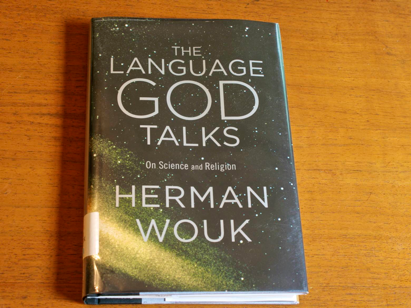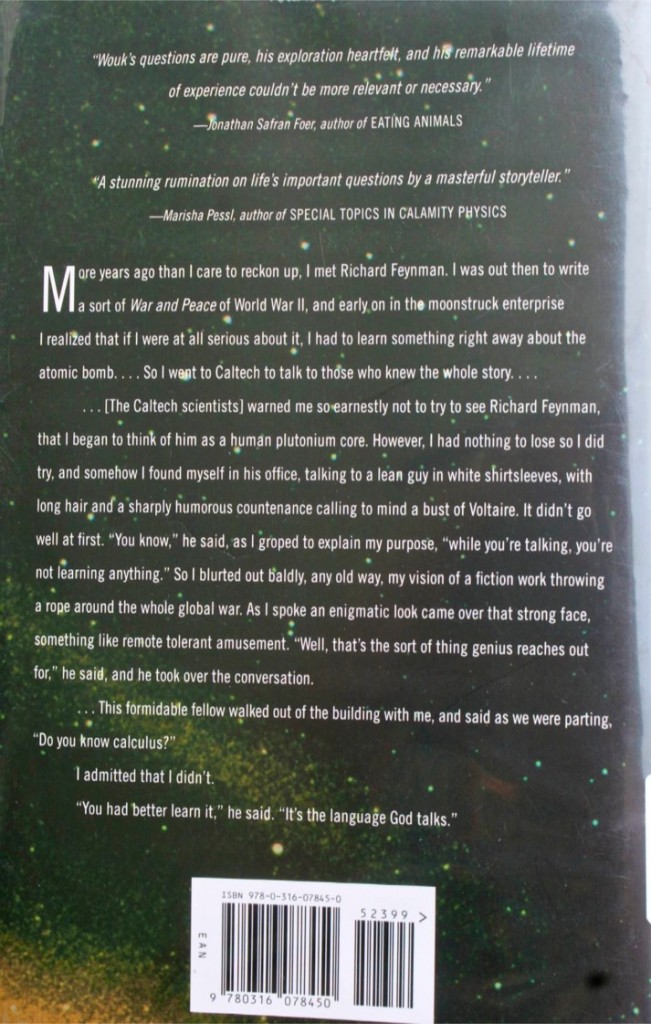
I’ve been a fan of Herman Wouk for a long time. Twenty-five years ago his sweeping WWII sagas Winds of War and War and Remembrance were atop my list of favorite books. And for as long as that, I’ve been also been fascinated with the interface between science and religion. To have these two come together in a new book meant I’ve read this as soon as I could get my hands on it, especially since this esteemed author had reportedly set out to show there was no clash between religion and science.
I respect this author’s life experience as a professional storyteller, a practicing Jew and an armchair scientist. The armchair science part of this book was strong and written for layman. The digression of retelling his novels as proverbial was unnecessary and the book would have been much better with chapter six and seven simply removed, since they detracted from the topic he was trying to explore; this rambling tangent was at best irrelevant. The last chapter where his religious views were touched upon was brief and inconclusive. He refers us to a previous book of his titled This is My God. I really wanted to like this book but I’m left debating with myself whether to give it three or four stars. I find my heart going out to this sincere and thoughtful author because I have found a clearer reconciliation between science and religion than he has and I’d love to share it with him.
Regarding the book’s title, Richard Feynman, the famous Caltech physicist, told Wouk that the “language God talks” is calculus. Having had a lot of both calculus and physics, I’d have to agree. Wouk explores this, but also finds God in the narrative as well as in the Talmud. I’d go so far as to say that God has as many languages as there are ears to hear.
Below are the bits I take forward from this book:
• Books this author recommends: The Quark and the Jaguar (by Gell-Mann); Six Easy Pieces (by Richard Feynman); The Double Helix (by James Watson); A Brief History of Time (by Stephen Hawking); The First Three Minutes (Stephen Weinberg)
• Newton summed up his life work: “I know not what I seem to the world, but to myself I seem to have been only like a boy playing on a seashore, and diverting myself in now and then finding a smoother pebble or a prettier shell, whilst the great ocean of truth lay all undiscovered before me.”
• James Jeans says, “God is a mathematician.”
• Churchill said, “You can count on the Americans to do the right thing, after they have tried everything else.”
• Michelangelo said of his own work, “I have patience to get to the desired end.”
• “The stage is too big for the drama.” Richard Feynman
• Two classics important to him: Fiddler on the Roof and The Analects of Confucius. They embody “the worldwide clash between tradition and enlightenment. That clash is the hard truth today about the Jews, still ‘the smallest of peoples’ as Moses called us, and about the Chinese, the largest.”
• “While you are talking, you’re not learning anything.” Richard Feynman
• “Rabid humanists and rabid believers may agree on nothing else, but on this one thing they now agree. There was a beginning. It happened.”
• “Bernard Cohen put the humanist view in the fewest best words, ‘I think it is all stochastic.’”
• “Sir Francis Crick acknowledged that consciousness remains an anomaly in molecular biology…”
• [Referring to the protracted history of the universe] “Has it really all been such a vastly drawn-out complex purposeless nonsense?”
• [He implies that the West’s 26 characters compared with the Chinese 10,000 characters is the simple reason that the West has had the upper hand until now when…] “a new great game is on, this time for world stakes.”
• Invariance: a holy grail of theoretical physics. The torah: a remarkable try at invariance.
• “We are alike. Alike in the joy of following and grasping long strings of tight logic, alike in the zest for the toughest mental challenges, in the rejection of flawed answers…”
• “In earlier times… religion was moral philosophy, science was natural philosophy, and enlightened men and women could be at home in both. Not today…”
• “John Wheeler… obliquely hints that the universe may require an Observer to exist at all…”
• [In the last analysis, religion asks science:] “How do you handle sorrow?” [and science acquiesces.]
 22010
22010


